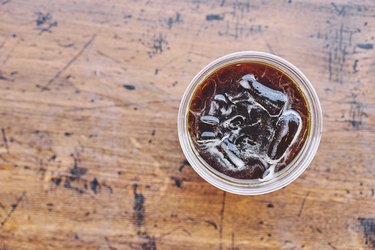
Dark chocolate is healthier than white chocolate, black rice is healthier than white rice and kale is healthier than iceberg lettuce. As for soda, color doesn't matter. Whether light or dark, soda has no nutritional value and is typically loaded with sugar and other unhealthy ingredients.
Tip
It doesn't make any difference whether it's light or dark; it's the ingredients that determine how unhealthy a soda is.
Video of the Day
Clear Soda Versus Dark Soda
Sodas vary widely in flavors, colors and ingredients. The ingredients in clear soda and dark soda are specific to the flavor and the brand. But many share a few common ingredients.
Video of the Day
Two types of soda produced by a major national brand — one lemon-lime flavored and one cola — have the same base ingredients: carbonated water and high-fructose corn syrup. The cola has caramel coloring to make it dark and it contains some natural flavoring. The clear lemon-lime soda doesn't contain coloring, but it contains citric acid and natural flavors.
According to data from the USDA, the cola and lemon-lime soda are almost identical in their nutritional profile. Per 12-ounce serving, both have 156 calories and 39 grams of carbohydrates, all of which come from sugar. Both drinks contain sodium — 43 and 68 milligrams in cola and lemon-lime soda, respectively. Neither has any other nutrients to speak of.
Health Effects of Soda
The color of a soda won't make it healthier or unhealthier — any type of soft drink containing sugar, high-fructose corn syrup or any other sweetener isn't good for your health.
According to the Centers for Disease Control and Prevention, sugar-sweetened beverages are the main source of added sugars in the American diet. Regular consumption of sugar-sweetened beverages is linked to weight gain and obesity, type 2 diabetes, heart and kidney diseases, a type of arthritis called gout, non-alcoholic liver disease and tooth decay.
According to research from Boston University, people who regularly consume a lot of sugary drinks tend to have poorer memory, reduced brain volume and a smaller hippocampus, which is the brain region responsible for learning and memory.
Some soda manufacturers make a point of declaring on the label that their product is made with pure cane sugar. This allays the fears of consumers who believe that it's high-fructose corn syrup, not sugar in general, that is the most dangerous sweetener.
But according to Harvard Health Publishing, there is no conclusive evidence that high-fructose corn syrup is metabolized differently in the body than cane sugar — or table sugar — or has any higher risks than regular sugar. Sugar is sugar, no matter its chemical makeup, and no type of sugar is good for you.
The American Heart Association recommends that adults limit their intake of added sugars to 100 calories per day for women and 150 calories for men. Just one can of clear or dark soda surpasses these daily limits.
Read more: The Top 10 Worst Soft Drinks for Your Health
What About Diet Soda?
Sugar is evil, but it isn't the only way to sweeten sodas. There are artificial sweeteners such as saccharin and aspartame, and "natural" sugar-substitutes (they are still refined), such as stevia, sorbitol, xylitol and erythritol. These sweeteners have few to no calories and no effect on blood sugar.
But that doesn't mean they're good for you and that you can drink diet sodas all day long with no worries. First of all, artificial sweeteners are known to cause digestive upset, especially when consumed in excess. Sugar alcohols, specifically, can have a laxative effect and cause bloating, gas and diarrhea.
When consumed in moderation, and instead of regular soda, diet soda may help you control your calorie intake and avoid excess sugar in your diet. However, that has not been proven as fact.
According to Harvard Health Publishing, there is some speculation that, because artificial sugars are so much sweeter than sugar, they can overstimulate sugar receptors and cause people to lose their taste for less sweet foods, such as fruits and vegetables. This may lead to increasing cravings for sweeter, high-calorie foods.
In addition, a meta-analysis published in Current Developments in Nutrition in May 2018 looked at data from a study examining regular and diet soda intake and risk of diabetes and concluded that switching from regular soda to diet soda may not reduce the risk of diabetes.
- USDA FoodData Central: "Coca-Cola Bottle, 12 fl oz"
- USDA FoodData Central: "Sprite Bottle, 1.75 Liters"
- Centers for Disease Control and Prevention: "Get the Facts: Sugar-Sweetened Beverages and Consumption"
- Boston University: "Is Soda Bad for Your Brain? (And Is Diet Soda Worse?)"
- Harvard Health Publishing: "Which Is Better, High-Fructose Corn Syrup or Table Sugar?"
- Mayo Clinic: "Artificial Sweeteners and Other Sugar Substitutes"
- Harvard Health Publishing: "Artificial Sweeteners: Sugar-Free, but at What Cost?"
- Current Developments in Nutrition: "Diet Soda and Sugar-Sweetened Soda Consumption in Relation to Incident Diabetes in the Northern Manhattan Study"
- American Heart Association: "Added Sugars"